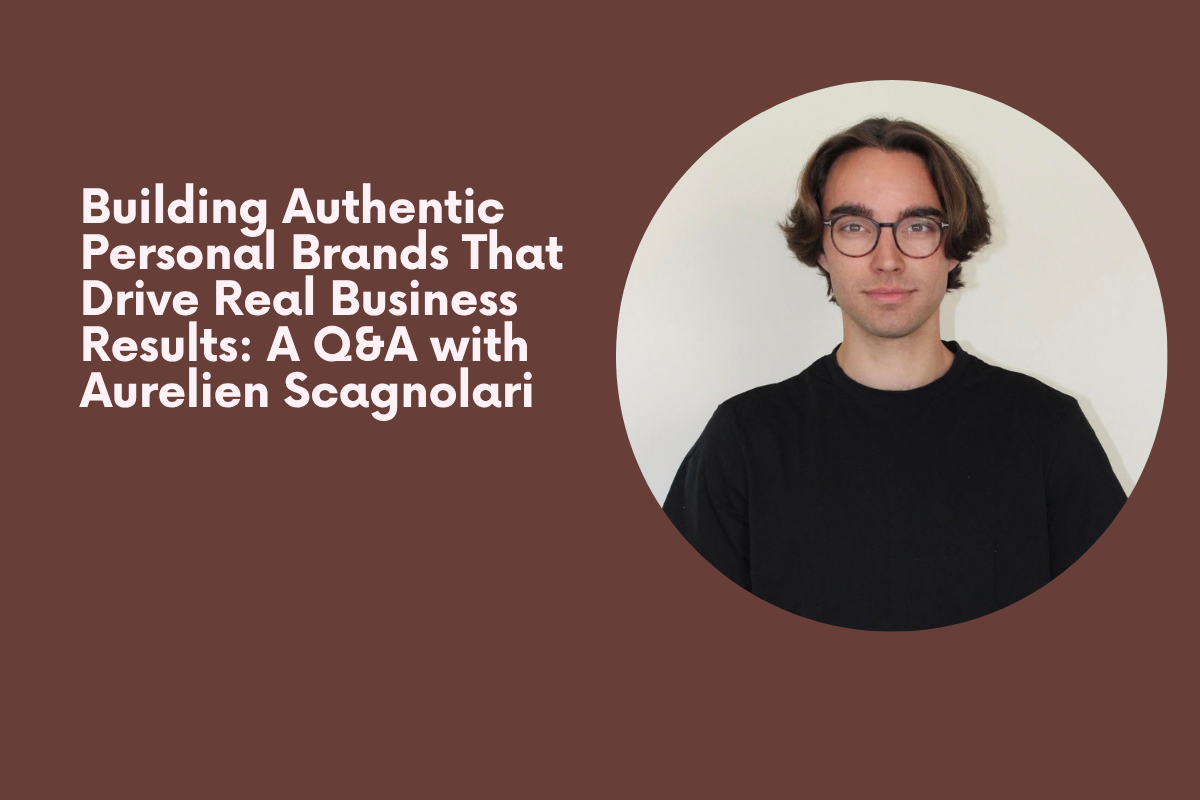In an era where B2B founders are increasingly expected to be the face of their companies, personal branding has evolved from a nice-to-have to a business imperative. Yet many founders struggle with how to authentically represent themselves online while driving measurable business outcomes.
Aurelien Scagnolari, Founder & CEO of CURAT-D, has built his reputation helping B2B founders transform their personal brands into revenue-generating assets. His agency has guided clients to generate multiple seven figures through organic content and strategic personal branding, focusing on long-term relationship building rather than quick wins.
In this exclusive Q&A, Aurelien shares his insights on measuring personal brand ROI, maintaining authenticity in an AI-driven content landscape, and building brands that stand the test of time. His approach challenges conventional wisdom about perfect content and instead emphasizes the power of genuine voice and strategic consistency.
Q: You've mentioned that CURAT-D has helped clients generate "multiple 7 figures" through organic content and personal branding. For B2B founders who are skeptical about investing time and resources into personal branding, what specific metrics and KPIs do you track to demonstrate tangible business impact? How do you measure the transition from brand awareness to actual revenue generation?
Aurelien Scagnolari: For most B2B founders, the hardest thing about personal branding is that attribution isn't always linear. Someone might read a post today, follow you for 6 months, then sign a $200K deal without ever filling out a "how did you hear about us?" form.
That's why I track two sets of metrics:
Lead indicators: reach growth, engagement from ICP, profile visits, inbound connection requests from target companies.
Lag indicators: number of qualified inbound leads, conversion rate of those leads, revenue generated from relationships first touched by content.
I always connect these dots back to actual sales activity. For example, if a prospect first connected after seeing a post, even if they came into the pipeline months later, that's brand driving revenue.
The key is to measure signal, not just vanity metrics. Views are nice, but comments from decision-makers, DMs asking for a call, or invitations to speak are the moments that show the brand is turning into pipeline.
Q: You've noted concerns about founders whose "content sounded like ChatGPT wrote it" and emphasized that "people don't need perfect sentences." As AI tools become more prevalent in content creation, how do you help founders maintain their authentic voice while still leveraging strategic frameworks? What's your process for identifying and amplifying a founder's unique perspective in an increasingly crowded digital space?
Aurelien Scagnolari: The best content doesn't sound perfect; it sounds like you. I've seen founders lose trust because their posts read like AI templates. People can spot that a mile away.
My process is always founder-first:
- We start with long-form conversations where I pull out stories, opinions, and off-the-cuff remarks.
- I distill those into strategic formats that perform well on LinkedIn, but the voice stays theirs—tone, quirks, even certain phrases they always use.
- AI is a tool in the process, not the author. It helps with speed and structure, but every sentence has to pass the "would you say this out loud?" test.
In a crowded feed, your edge isn't perfect grammar—it's the way you see the world. Strategy matters, but authenticity is what people remember.
Q: Given your philosophy that "the work you're doing today isn't for today—it's for a month, a year, a decade from now" and your focus on building "digital legacies," how do you help founders future-proof their personal brands? As markets evolve and new platforms emerge, what core principles remain constant in personal brand building, and how do you adapt strategies for long-term relevance?
Aurelien Scagnolari: Most founders think personal branding is a quarter-by-quarter game. It's not—it's compounding. The work you're doing today shows up in your opportunities months or years later.
Core principles that never change:
- Consistency: show up regularly, even when you're not "selling."
- Relevance: speak to the problems and ambitions of your audience, not just your own milestones.
- Trust-building: transparency and genuine insight beat hype every time.
What does change is the format. Ten years ago, the main stage was blogs. Today it's LinkedIn and short video. Tomorrow, maybe it's something else. The distribution will evolve—the principles don't.
When I help founders future-proof, I focus on two things:
- Building an asset library of stories, frameworks, and proof points that can be repurposed anywhere.
- Developing a voice and positioning that's platform-agnostic, so if tomorrow everyone's on a new app, you're not starting from scratch.
The founders who win long-term aren't chasing the algorithm of the day—they're building relationships and reputation that transcend any single platform.





.png)